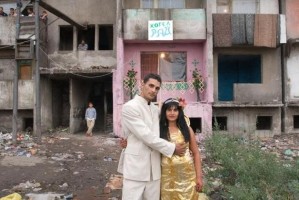


Sophia Tzavella: Paradise Hotel

It seems to be in the middle of nowhere, and isolated it is, what was meant to be (25 years ago) a place to live, in noble decency, planned to house the Romas by the socialist government. Today block 20 is a pigpen with no water and often no electricity, with garbage all over, people throwing their swill from the balconies, and doing shit anywhere, rats all over. Disgusting living conditions.
The director has chosen a complicated, yet interesting structure. Upfront and towards the last part of the film, she goes with hardcore social documentation: Inside and outside the appartments, talking faces, stories about the unbelievable poverty and why they choose to stay here (what could the alternative be?). In some cases she goes close, in others she stays with a distance. There is a dynamic pace in the narrative, no sentimentalism, this is how it is, carried by a strong musical score. In between there are some staged sequences, for instance with an albino, whose enigmatic silent role in the film I never really understood.
… and then documentation is taken over by Fellini! A marriage is going to be, and colourful and entertaining it becomes with the young couple’s appartment being painted, everyone getting dressed up, music, dance, food, happiness, and a sign saying ”Paradise Hotel”. The director makes a point, dreams of a better world with her protagonists for whom you can only have empathy.
The market is full of films about romas and the living conditions, this is one of the better ones.
Bulgaria, 2010, 54 mins., HBO Central Europe & Agitprop